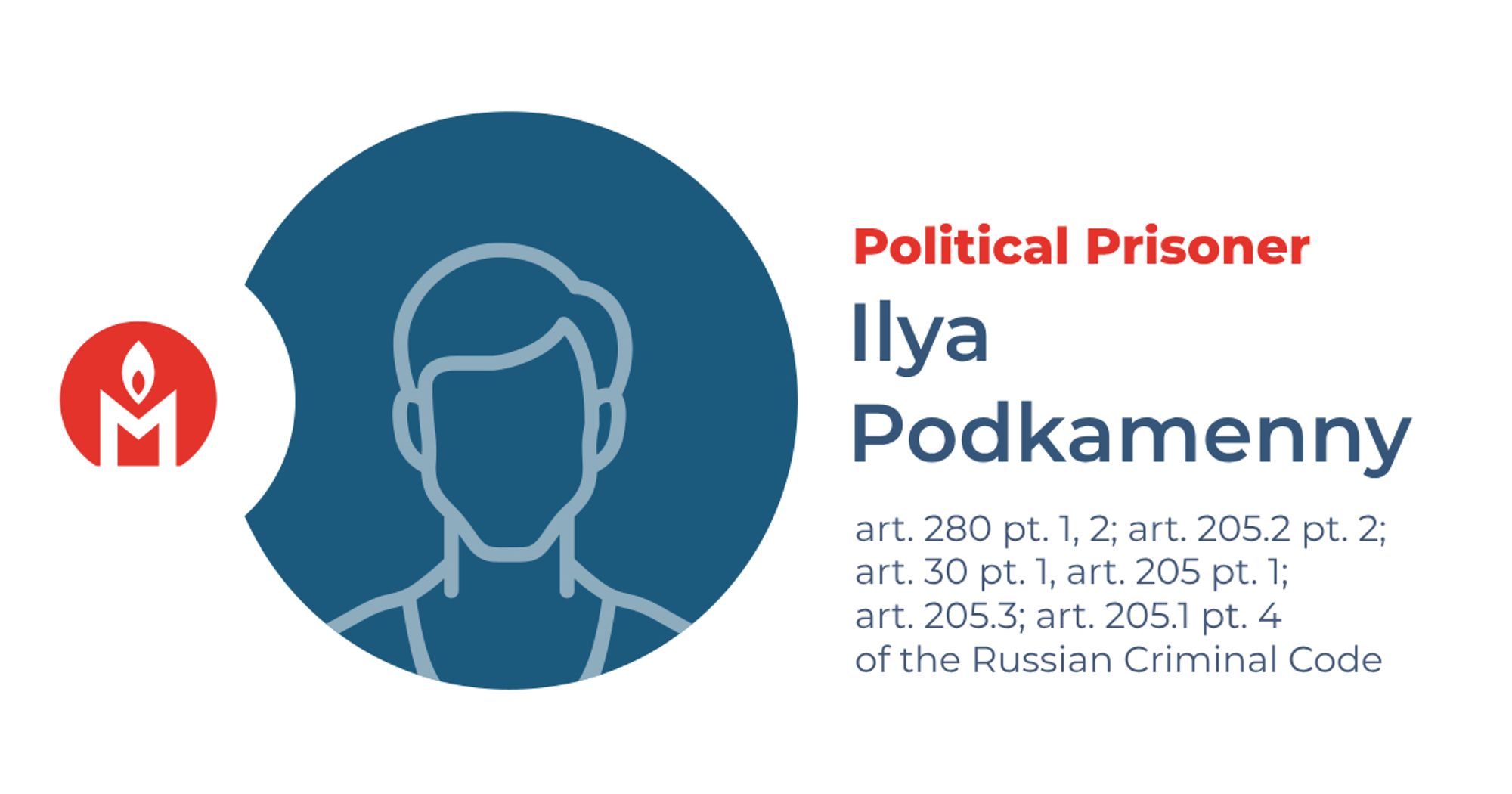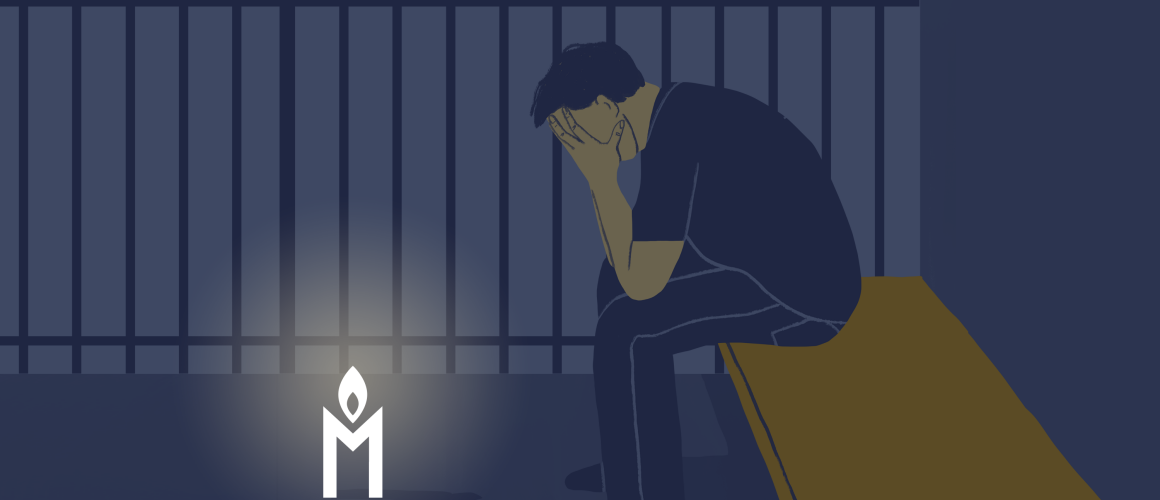Ilya Podkamenny is a political prisoner
The 19-year-old activist from Irkutsk has been sentenced to 12 years in a strict regime penal colony
The ‘Political Prisoners. Memorial’ human rights project in accordance with international standards, considers Ilya Podkamenny a political prisoner. He has been convicted of inciting extremism and propaganda of terrorism on account of leaflets he left on railway tracks and posts he made on Telegram. He has also been convicted on charges of training in terrorist activities, facilitation of terrorist activities and preparation for a terrorist act for having downloaded a book from the Internet about preparing incendiary materials and collecting money in cryptocurrency with which he bought flammable liquids. Podkamenny’s prosecution violated his right to fair trial and his sentence is disproportionate to the danger of the offence.
We demand the release of Ilya Podkamenny and that his case be retried in a fair hearing.

What are the charges against Ilya Podkamenny?
According to the investigative authorities, in May 2022 Ilya Podkamenny, a 17-year-old activist from Irkutsk, protested against the war on a railway line. He allegedly attached sheets from a school copybook that contained slogans against Putin and the war to one of the tracks. The driver of a freight train stopped it and gathered up the sheets on which were written ‘Death to Russkies!’, ‘Instead of sheets of paper Putinists will hang here’ and ‘Freedom for Siberia!’ The train driver handed the sheets over to the police and the police handed them to the FSB. A criminal case was opened against Podkamenny, whose dacha is not far from the scene of the incident, for incitement to extremism (Article 280, Part 1, of the Russian Criminal Code).
The investigators also considered that, before Podkamenny was detained, he had been running a Telegram channel entitled ‘Siberian Liberation Movement — the Federative States of Siberia’. For publications on this channel, Podkamenny was charged with incitement of extremism (Article 280, Part 2, of the Russian Criminal Code) and incitement of terrorism (Article 205.2, Part 2, of the Russian Criminal Code)
The investigative authorities also alleged that Podkamenny planned to set fire to a military recruitment centre in the town of Dzerzhinsk in Irkutsk region. He was therefore charged with preparing an act of terrorism (Article 30, Part 1, in conjunction with Article 205, Part 1, of the Russian Criminal Code). For downloading a book on the preparation of incendiary materials, he was also charged with training in terrorist activities (Article 205.3 of the Russian Criminal Code); and for allegedly collecting 8,000 roubles in cryptocurrency to purchase materials to set fire to a military recruitment centre, he was charged with assisting terrorist activities (Article 205.1, Part 4, of the Russian Criminal Code).
Podkamenny was detained on 15 November 2022 and placed under house arrest. In December, he attempted suicide, after which he was placed in a psychiatric hospital and then remanded in custody.
Podkamenny’s mother appeared as a witness for the prosecution in Podkamenny’s trial, saying he had ‘wanted to set military recruitment centre on fire.’
On 19 October 2023, the 1st Eastern District Military Court sentenced Podkamenny to 12 years’ imprisonment, of which the first three years were to be served in a cell-type prison and the rest in a strict regime penal colony.
Why do we consider Podkamenny a political prisoner?
We consider the protest on the railway line presented no significant threat to society. Podkamenny did not call for extremism but expressed his rejection of the Putin regime and of the aggressive war against Ukraine the regime has unleashed.
We do not know whether Podkamenny was in fact the author of publications calling for military recruitment centres to be set on fire. Nevertheless, we believe that such calls cannot be regarded as incitement of terrorism, nor can preparation for arson of a military recruitment centre be regarded as preparation for a terrorist act. The purpose of arson attacks on military recruitment centres is not to intimidate the population, which is a necessary element of any act of terrorism, but to counter the Russian aggression against Ukraine. Accordingly, preparation for arson should be classified only as a less serious offence, such as, for example, intentional destruction of property.
In this regard, the study of books about incendiary materials cannot be classified as training in terrorist activities, nor can the collection of money in a personal account be considered as organising the financing of terrorism.
A detailed description of the case of Ilya Podkamenny and the position of the ‘Political Prisoners. Memorial’ human rights project are set out on our website.
Recognition of an individual as a political prisoner does not imply the ‘Political Prisoners. Memorial’ human rights project agrees with, or approves of, their views, statements, or actions.
How can you help?
You can write a letter to Ilya Podkamenny at the following address:
In Russian: 664019, г. Иркутск, ул. Баррикад, д. 63, ФКУ СИЗО-1 ГУФСИН России по Иркутской области, Подкаменному Илье Вячеславовичу, 2004 г. р.
In English: Ilya Vyacheslavovich Podkamenny (born 2004), Remand Prison No. 1, Federal Penitentiary Service of Russia for Irkutsk region, 63 Barrikad Street, Irkutsk 664019, Russia.
You can also send an electronic letter via F-Pismo if you use Russian bank services and via PrisonMail if you use other banks.
Please note that letters in languages other than Russian are highly unlikely to reach the recipient.
You can donate to support all political prisoners in Russia.

